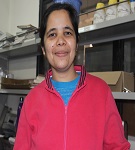BIO
Dr. Radha Tomar joined as a Marie Curie ADAGIO fellow at the University of Bordeaux (IECB/CBMN) in December 2023 as a Marie Curie ADAGIO fellow. She is currently employed in Prof. Gilles Guichard's research group at the IECB/University of Bordeaux. Her research work is primarily focused on the synthesis of biomimetic foldamer catalysts for asymmetric C-C bond formation reactions and applications in the synthesis of advanced intermediates. Dr. Radha’s academic background includes a degree of Bachelor of Science (B.Sc.) and Master of Science (MSc.) in Chemistry from the CCS University Meerut, India. In 2015, she passed the NET/JRF examinations and earned Research Fellowships by the Council of Scientific and Industrial Research (CSIR) of the Government of India. In 2016, she joined the research group of Prof. S. Arulananda Babu in the Chemical Sciences department of the Indian Institute of Science Education and Research (IISER) in Mohali, India. For the first two years she was a recipient of a Junior Research Fellowship (JRF) and later was upgraded to Senior Research Fellowship (SRF) for the following three years. During her SRF she was involved in mentoring junior doctoral students and lab management activities. Her research work mainly focused on the enantio- and diastereoselective C-H functionalization strategies, and direct lactamization methodology. She earned her Ph.D. in 2023 with a thesis entitled “Studies on the β-C(sp3)-H functionalization toward the synthesis of β-arylated unnatural amino acid derivatives."
PROJECT
My project centers around the exploration of enantiopure aliphatic oligoureas, a subclass of helical foldamers characterized by H-bond donor groups and a structural resemblance to the α-helical protein backbone. Initial observations from the host group at the University of Bordeaux in collaboration with researchers from EPV/EHU indicate that these helically folded oligoureas (i) feature a site for anion recognition near the positive end of the helix macrodipole and (ii) act synergistically with a Brønsted base component, promoting the Michael reaction between enolizable carbonyl compounds and nitroolefins at very low chiral catalyst/substrate ratios and with high enantiocontrol. In this project, the inherent modularity in the design of foldamers will be exploited to achieve three main objectives: (1) the engineering of foldamers with the ability to catalyze new molecular transformations with a focus on the reusability of the catalyst, (2) the exploration of mechanisms and origins contributing to the observed high selectivity and (3) the investigation of the reusability of the catalyst in the broad context of sustainable manufacturing and synthesis. The project will thus provide a strong impetus for the use of helical fodamers as chiral components of catalytic systems to investigate new, and challenging selective chemical transformations, as well catalyst recycling methods.
